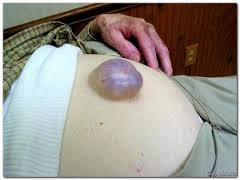
What is an Umbilical Hernia?
 What is an Umbilical Hernia?
What is an Umbilical Hernia?
Hernias, openings in the abdominal wall, are common in patients with ascites because of the pressure exerted by the fluid on the abdomen. The navel may be pushed out due to an umbilical hernia. Hernia repair should be done only by surgeons experienced in treating cirrhosis patients, the American College of Gastroenterology states, and only if absolutely necessary.
In cirrhotic patients, umbilical hernias occur almost exclusively when longstanding ascites is present. Umbilical hernias expose cirrhotic patients to potentially life-threatening complications such as strangulation (which can be precipitated by rapid removal of ascitic fluid) and rupture (which is usually preceded by cutaneous ulcerations on the surface of the hernia).
In cirrhotic patients, prevention of umbilical hernias is based on prevention of ascites. When prevention has failed, medical treatment of ascites should be first attempted. In patients in whom medical treatment is effective, and after ascites has disappeared, surgical treatment of umbilical hernia can be safely performed in most cases.
In patients in whom medical treatment is ineffective and who develop refractory ascites, treatment strategy for umbilical hernia depends on the presence or absence of indication for liver transplantation. In patients who are candidates for liver transplantation, careful local care with pressure bandage must be performed until transplantation.
Herniorrhaphy must be performed at the time of transplantation. In patients with refractory ascites, and who are not candidates for transplantation, portocaval shunt, transjugular intrahepatic portocaval shunt (both followed by surgical herniorrhaphy when ascites has disappeared) or concomitant peritoneo-venous shunt and herniorrhaphy should be considered.
In contrast to umbilical hernias, groin hernias are not markedly influenced by ascites. However, ascites is a major risk factor for surgery. Therefore, surgical repair should not be recommended in patients with ascites and poor liver function.
In cirrhotic patients with incisional hernia, prosthetic devices should be avoided because of the high risk of bacterial infection.